| . | . | . | |
| ka | mosquito | ||
| kabayaki | . | grilled opened-up and skewered fish with thick sweetened soy sauce | |
| kabocha | 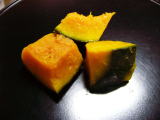 |
pumpkin | |
| kabu/kabura | . | Japanese turnip | |
| kabutomushi | beatle | ||
| kaeru | 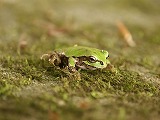 |
frog | |
| kafunsho | hay fever pollenallergy |
||
| kagamimochi |  |
Old mirror shaped round rice cakes offerd to the gods | |
| kagaribi | 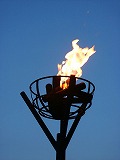 |
bonfire | |
| kagi |  |
key | |
| kai | shell/shell meat | ||
| kaiawase | Clam shell game in the Heian period. | ||
| kai-bashira | . | scallop | |
| kaichuu-togyo | 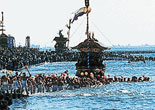 |
to carry a portable shrine across the sea | |
| kaiseki ryori | . | tea-ceremony dishes | |
| kairamban | 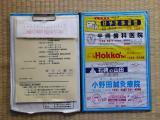 |
circular bulletin | |
| kaiten-zushi/ |
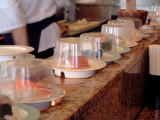 |
revolving table style sushi bars | 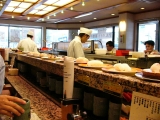 |
| kaiware daikon/ |
. | shoots of radish | |
| kaji | fire | ||
| kaki /柿 | 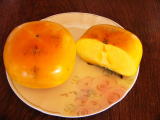 |
persimmon | |
| kaki /牡蠣 | . | oyster | |
| kakiage | . | a kind of tempura (shrimp, shellfish, carrot, burdock, onion etc.) | |
| kakigoori | 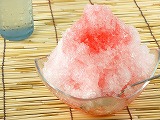 |
shaved ice served with flavored simple syrup |
|
| kakkonto | . | antifebrile infusion | |
| kamaboko | 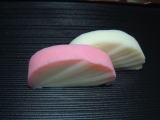 |
fish-paste loaf | |
| kamado | . | old style kitchen range | |
| kamakiri | 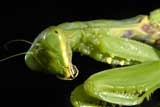 |
mantis | |
| kamasu | . | sea pike | |
| kambutsu | . | dried food | |
| Kamezaki Shiohi Matsuri |
 |
Kamezaki Shiohi Festival is held in May 3 and 4. Local people who are in the original jacket of each area draw a beautiful festival float at the waterside. |
|
| kaminari | thunder, lightning | ||
| kaminari-sama | In old days, parents told children that thunder and lightning are caused
by "kaminari-sama". When he plays the drum, they are caused. Kaminari-sama has one or two horns, and wears a tiger-skin pants. ( It is said that kaminari-sama likes navels, so in summer if children sleep without covering navels, he will come and eat their navels. (This has been said to protect children from catching cold in their sleep) |
||
| Kaminoma Hadaka Matsuri |
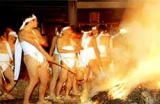 |
Kaminoma Naked Festival | |
| kami-omutsu | 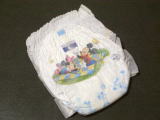 |
disposable daper | |
| kamo | . | wild duck | |
| kampai 乾杯 |
toast, cheers | ||
| kampyo 干瓢 |
. | dried gourd strip | |
| kanabou 金棒 |
 |
iron (metal) club Japanese expression [Oni ni kanabou] (lit. A demon with an iron) mention to a situation of double advantage. |
|
| kanazuchi 金槌 |
hammer | ||
| kandenchi 乾電池 |
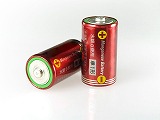 |
dry battery | |
| kani 蟹 |
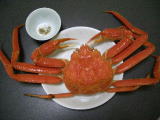 |
crab | |
| kanijiru 蟹汁 |
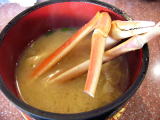 |
miso soup with crub meats. | |
| kanmidokoro 甘味処 |
- | Cafe which serve traditional sweets or dessert. |
|
| Kanningu (cunning) カンニング |
- | Cheating | |
| kanransha 観覧車 |
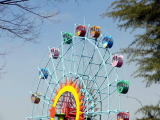 |
ferris wheel | |
| kanroni 甘露煮 |
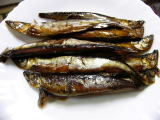 |
a kind of simmered food. Boiled fish sweetened with soy sauce, sweet sake(mirin), sake, sugar and sometimes ginger. |
|
| kanten 寒天 |
. | agar | |
| kappa 合羽 |
sushi-restaurant word for cucumber. | ||
| kappa 河童 |
an imaged animal. Kappa has a plate on its head, and if it's dried it dies. |
||
| kappu-men カップ麺 |
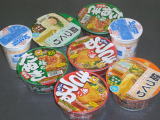 |
pot noodle | |
| Kappu nuudoru | 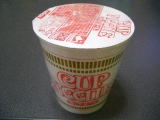 |
Cup Noodle (instant noodle) produced by Nisshin Shokuhin Co. Ltd.(Nisshin
Food Product Co. Ltd.) reasonable and very popular |
|
| karaage | . | a method of deep-flying. Karaage of checken is the most popular. | |
| Karakuri-ningyo | |||
| Karakuri-dokei | 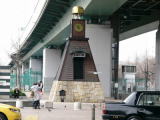 |
Automation Clock |
|
| karasu | . | craw Today they make troubles in the town. |
|
| karê udon | Japanese noodles with thicken curry taste soup | ||
| karei | flatfish | ||
| kareiraisu | curry and rice one of the most popular food among the young people |
||
| karin | quince | ||
| kasa-jizo |  |
||
| kasa-obake | one of the traditional Japanese hobgoblins in folk tales kasa means an umbrella |
||
| kashiwa | . | chicken, Nagoyan people sometimes call chicken 'kashiwa'. 'toriniku7 is more popular word. |
|
| kashiwa-mochi | 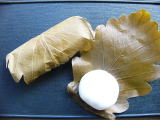 |
Round shaped Japanese cake stuffed with sweet red bean paste (an) and wrapped in an oak leaf. Kashiwamochi is eaten especially on May 5th, Children's Day (Boy's Day) called Tango-no-sekku on which we hope that little boys will grow up in good health. An oak leave is a symbol of prosperity of posterity because its old leaf never fall until when a shoot comes out. <- kansai style |
|
| kasutera | . | Castella cake | |
| kataguruma | ride ex. walk with a child on one's shoulder |
||
| Katakuri | 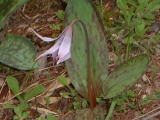 |
Japanese | |
| katana | a Japanese sword, nihon-to | ||
| katori-senko | anti-mosquito incense |
||
| katsu-don | a bowl f rice with a pork cutlet, egg, sliced leek and nori on top | ||
| katsuo | 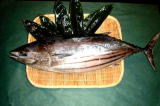 |
bonito | |
| katsuobushi | dried bonito | ||
| katsuo no tataki | 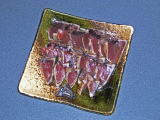 |
- | |
| kawabiki | 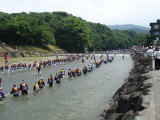 |
- | |
| kayabuki-yane | 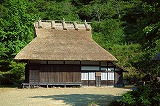 |
thatched roof | |
| kazaguruma | 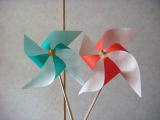 |
pinwheel |
|
| kazamidori | weathercock | ||
| kazarigiri | 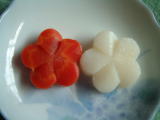 |
to cut vegetables in beautiful shape (pic/ Japanese apricot flowers) |
|
| kaze-no-bon | 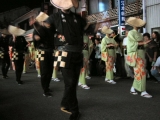 |
Kaze no bon is held in Yatsuo-machi (Toyama Pref ) from Sept. 1st to 3rd. It's in typhoon season, in order to calm a god of wind and pray for good harvest every year. |
|
| kazura-bashi | 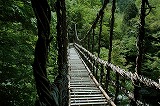 |
A bridge made of vines | |
| Kei | - | Kei stands for Kei-Jidosha/minicar , under 660cc-engine, under 3.40m-length, under 1.48m-wide and under 2.00m hight.. Color of the mumber plate is yellow. |
|
| keiryo-supuun | measure spoon | ||
| keitai 携帯 |
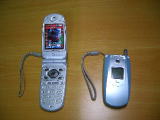 |
Today, if you say "keitai", it means a cellular phone. | |
| Kempo-kinenbi 憲法記念日 |
Constitution memorial Day Holiday |
||
| kendama ケン玉 |
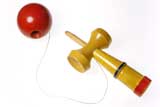 |
play cup and ball | |
| kendo 剣道 |
 |
Japanese traditional martial arts. Kendo. | |
| kenka-goma 喧嘩独楽 |
Kenka means fighting and goma/koma means a top. If your top is bump out from the rink, you lose. |
||
| ken-ken-(pa) ケンケンパ |
Draw a scarecrow on the ground like a picture left. First, throw a stone/taw
in the front square, and skip that square and hop ahead like the boy is doing. When he returns, he picks up the stone/taw and hop that square. Then he throw his taw into the second square..... The scarecraw has two sleeves (two squares) and the cap is divided into two parts. There he has to stand on each square at the same time with his each foot.. |
||
| keshigomu 消ゴム |
eraser | ||
| kibasen 騎馬戦 |
Game of cavalry battle Three people take a role of horse. One people get on the horse and take other rider's cap. |
||
| kibamusha 騎馬武者 |
samurai who ride a horse and fight | ||
| kiji 雉 |
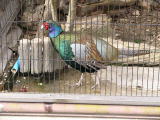 |
pheasant Japan's national bird a larger photo |
|
| kikka-ten (kikka-taikai) 菊花展 |
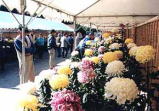 |
chrysanthemum exhibition In autumun, we have kikka-ten all over Japan. ex. Nagoya castle |
|
| kiku 菊 |
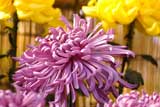 |
chrysanthemum | |
| kikyuu 気球 |
balloon | ||
| kinkanNisshoku 金環日食 |
- | Annular eclipse KinkanNisshoku, May 21, 2012 |
|
| kin no tokei 金の時計 |
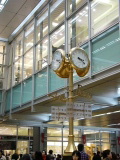 |
Gold Clock One of the most popular meeting spot in Nagoya Station. map |
|
| kinoko キノコ |
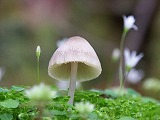 |
mashroom | |
| kinome 木の芽 |
bud, sprout | ||
| kinshiko 金絲猴 |
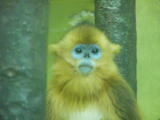 |
golden monkey ( Click the pic to enlarge. It is said that the hero of Monkey King is modeled on golden monkey. |
|
| Kintaro 金太郎 |
Kintaro is the name of Sakata-no-Kintoki's childhood name. And One of the hero of Japanese legend of super strong boy. |
||
| kinukatsugi 衣被ぎ |
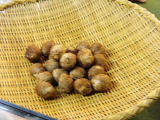 |
a family of taro. Kinukatsugi is offered to the moon on the jugoya night (August 15 of the lunar calendar). |
|
| kirin キリン |
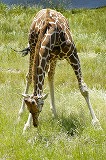 |
giraffe | |
| kishimen きしめん |
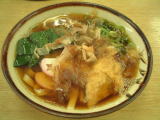 |
Nagoyan special flat noodle. Simple and tasty. Soy sauce based soup. |
|
| kishodai 気象台 |
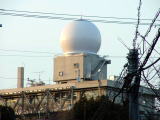 |
meteorogical observatory (pic: Nagoya Meteorogical Observatory) |
|
| kisu 鱚 |
- | sillago, Japanese whiting | |
| kitsune soba きつね蕎麦 |
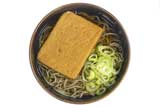 |
||
| kitsune udon きつねうどん |
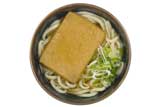 |
||
| kobu/kombu 昆布 |
kelp | ||
| Koen | Park (Park in and around Nagoya ) | ||
| koguchi-giri 小口切り |
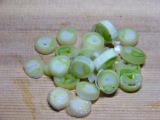 |
one of the way of cutting the way of cutting for thin vegetables, like leek, cucumber, etc. thickness is depend on cooking or ingredients |
|
| kogyo-chitai 工業地帯 |
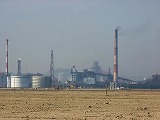 |
industrial area | |
| koin randorii コインランドリー |
 |
coin-operated laundry | |
| Koizumi Junichiro 小泉純一郎 |
Prime Minister of Japan (2001- ) | ||
| koke 苔 |
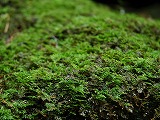 |
moss Moss is a very important item twhen we make Japanese garden. |
|
| kokkai-gijido 国会議事堂 |
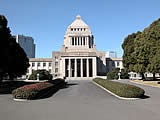 |
The Diet Building (Tokyo) | |
| kombu/kobu | kelp | ||
| koma 独楽 |
top | ||
| komainu | 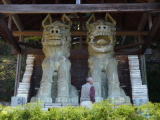 |
Koma of komainu means Korea and inu means a dog. Guardian "dog" figure (Actually they are not dogs) |
|
| kome 米 |
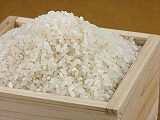 |
rice | |
| komedawara 米俵 |
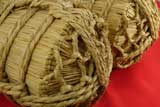 |
bag of rice | |
| kompeito 金平糖 |
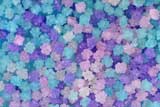 |
confetti, star-shaped candy | |
| Konkatsu 婚活 |
婚活 Seeking Marriage. Kon means kekkon 結婚 and Katsu means katsudo 活動. New words. => Rikatsu |
||
| konnyaku 蒟蒻 |
 |
made from a root of devil's tougue. formed into bricks or strings |
|
| konnyaku or konnaku-imo 蒟蒻(芋) |
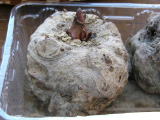 |
Konnyaku above is made from konnyaku-imo. It's a family of taro and introduced from India long time ago. Grows alomst 1m tall. Males and females are diferent roots. |
|
| Konsento (consent) コンセント |
- | Outlet | |
| koodori (suru) 小踊り |
jump (dance) for joy | ||
| Kopipe | - | Copy and paste | |
Korankei 香嵐渓 |
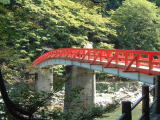 |
Koranke is one of the popular spots for viewing beautiful maple leaves especially in autumn and spring.. Near Toyota. |
|
| koreisha mark (momiji mark) 高齢者マーク |
sign of an aged driver putting this mark is not duty. This is for protecting an aged driver. We must cut in or disturb the car with this mark. If you transgress this rule, you have to pay a less than 50,000yen fine and will be reduced your point (-1 point) |
||
| koro 香炉 |
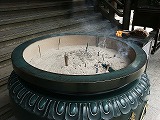 |
censer, thurible | |
| koshuu-denwa 公衆電話 |
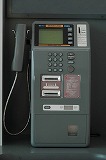 |
public phone | |
koto 琴 (or So筝) |
Japanese harp which introduced from China in the 7th to 8th century. It has 13 strings and the sound is so beautiful. One of the Koto music "Haru no umi" is recommended ! |
||
| kotoji 琴柱 |
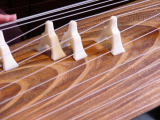 |
Kotoji is a bridge used for tuning koto sound. | |
| koyo 紅葉 |
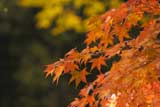 |
red/yellow leaves | |
| ku 区 |
A ku (区), translated as ward, is a district in a large city, as well as Tokyo, Osaka, Nagoya, Yokohama, Sapporo, etc. |
||
| kudamono 果物 |
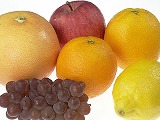 |
fruit | |
| kujira 鯨 |
whale | ||
| kuma 熊 |
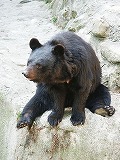 |
bear | |
| kumazasa 熊笹 |
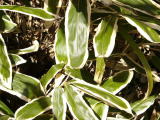 |
low and striped bamboo; Sasa albo-marginate | |
| kumo 雲 |
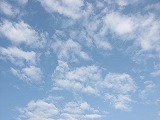 |
cloud | |
| kumo 蜘蛛 |
 |
spider | |
| kunoichi くの一 |
ku-no-ichi means female ninja. Because "female" in kanji "女" is composed by "く" ("ku" in hiragana), ノ ("no" in katakana and 一 (ichi in kanji) |
||
| kuramatengu 鞍馬天狗 |
Kuramatengu was a hero in a movi taken a role by Arashi Kanjuro. The first film was released in 1927. |
||
| kureen クレーン |
 |
crane | |
| kuri 栗 |
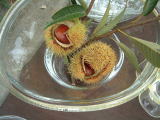 |
chestnuts | |
| kurikinton 栗金団 |
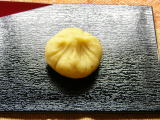 |
Japanese cake made by chestnuts paste | |
| kuroko 黒子 |
 |
Kuroko who dress all in black help performers (Including dolls in Bunraku,
etc.) on the stage remaining in the background. |
|
| kûru-bizu クールビズ |
Cool Biz A state minister for the environment, Yuriko Koike, has corporated fashion into the government's energy-saving efforts by promoting the summer's "Cool Biz" and winter's "Warm biz" campaigns |
||
| kusamochi 草餅 |
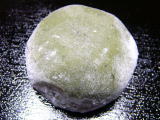 |
Kusa means grass, herb or weed. One of the very popular Japanese sweets. Mochi flavored with mugwort leaves. Sweet red beans called an is filled inside. |
|
| kusari 鎖 |
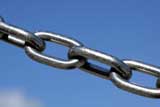 |
chain | |
| kusawake 草分け |
- | pioneer | |
| kushami くしゃみ |
sneezing | ||
| kyakusha 客車 |
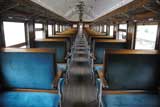 |
passenger car, coach | |
| kyukyusha 救急車 |
ambulance | ||
| kyuuri 胡瓜 |
.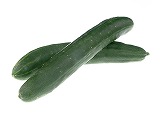 |
.cucumber | |
| . | . | . | |
| . | . | . | |
| . | . | . | |
| . | . | . | |
| . | . | . | |
| . | . | ||